Zifan Song
Trade in Minutes! Rationality-Driven Agentic System for Quantitative Financial Trading
Oct 06, 2025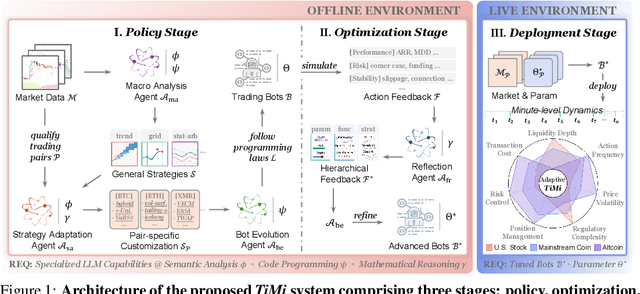
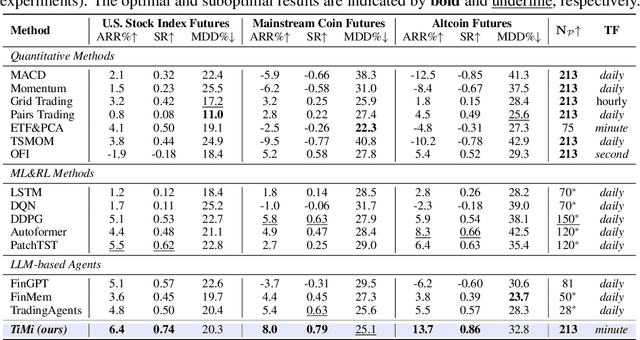
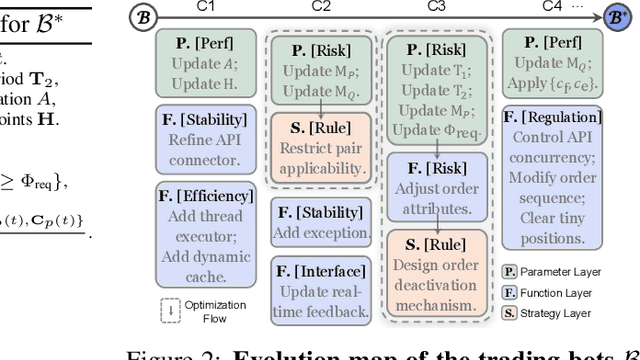
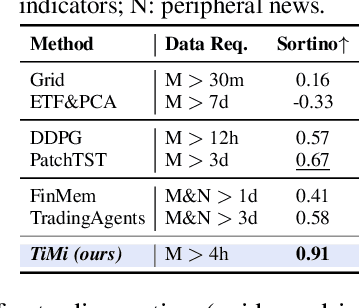
Abstract:Recent advancements in large language models (LLMs) and agentic systems have shown exceptional decision-making capabilities, revealing significant potential for autonomic finance. Current financial trading agents predominantly simulate anthropomorphic roles that inadvertently introduce emotional biases and rely on peripheral information, while being constrained by the necessity for continuous inference during deployment. In this paper, we pioneer the harmonization of strategic depth in agents with the mechanical rationality essential for quantitative trading. Consequently, we present TiMi (Trade in Minutes), a rationality-driven multi-agent system that architecturally decouples strategy development from minute-level deployment. TiMi leverages specialized LLM capabilities of semantic analysis, code programming, and mathematical reasoning within a comprehensive policy-optimization-deployment chain. Specifically, we propose a two-tier analytical paradigm from macro patterns to micro customization, layered programming design for trading bot implementation, and closed-loop optimization driven by mathematical reflection. Extensive evaluations across 200+ trading pairs in stock and cryptocurrency markets empirically validate the efficacy of TiMi in stable profitability, action efficiency, and risk control under volatile market dynamics.
Chain-of-Model Learning for Language Model
May 17, 2025Abstract:In this paper, we propose a novel learning paradigm, termed Chain-of-Model (CoM), which incorporates the causal relationship into the hidden states of each layer as a chain style, thereby introducing great scaling efficiency in model training and inference flexibility in deployment. We introduce the concept of Chain-of-Representation (CoR), which formulates the hidden states at each layer as a combination of multiple sub-representations (i.e., chains) at the hidden dimension level. In each layer, each chain from the output representations can only view all of its preceding chains in the input representations. Consequently, the model built upon CoM framework can progressively scale up the model size by increasing the chains based on the previous models (i.e., chains), and offer multiple sub-models at varying sizes for elastic inference by using different chain numbers. Based on this principle, we devise Chain-of-Language-Model (CoLM), which incorporates the idea of CoM into each layer of Transformer architecture. Based on CoLM, we further introduce CoLM-Air by introducing a KV sharing mechanism, that computes all keys and values within the first chain and then shares across all chains. This design demonstrates additional extensibility, such as enabling seamless LM switching, prefilling acceleration and so on. Experimental results demonstrate our CoLM family can achieve comparable performance to the standard Transformer, while simultaneously enabling greater flexiblity, such as progressive scaling to improve training efficiency and offer multiple varying model sizes for elastic inference, paving a a new way toward building language models. Our code will be released in the future at: https://github.com/microsoft/CoLM.
AlchemistCoder: Harmonizing and Eliciting Code Capability by Hindsight Tuning on Multi-source Data
May 29, 2024Abstract:Open-source Large Language Models (LLMs) and their specialized variants, particularly Code LLMs, have recently delivered impressive performance. However, previous Code LLMs are typically fine-tuned on single-source data with limited quality and diversity, which may insufficiently elicit the potential of pre-trained Code LLMs. In this paper, we present AlchemistCoder, a series of Code LLMs with enhanced code generation and generalization capabilities fine-tuned on multi-source data. To achieve this, we pioneer to unveil inherent conflicts among the various styles and qualities in multi-source code corpora and introduce data-specific prompts with hindsight relabeling, termed AlchemistPrompts, to harmonize different data sources and instruction-response pairs. Additionally, we propose incorporating the data construction process into the fine-tuning data as code comprehension tasks, including instruction evolution, data filtering, and code review. Extensive experiments demonstrate that AlchemistCoder holds a clear lead among all models of the same size (6.7B/7B) and rivals or even surpasses larger models (15B/33B/70B), showcasing the efficacy of our method in refining instruction-following capabilities and advancing the boundaries of code intelligence.
InternLM2 Technical Report
Mar 26, 2024
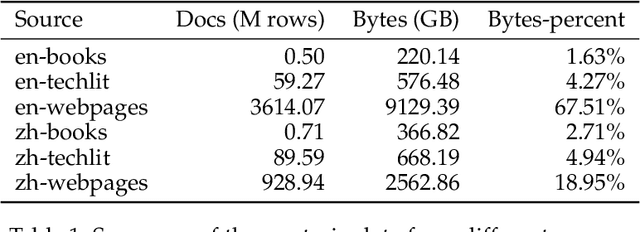
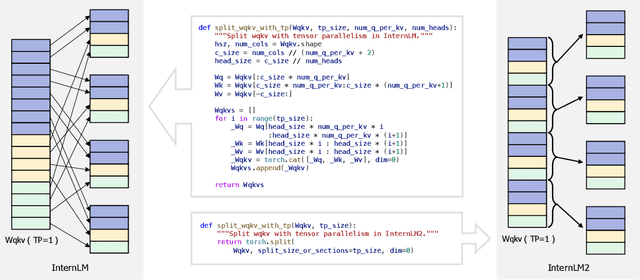

Abstract:The evolution of Large Language Models (LLMs) like ChatGPT and GPT-4 has sparked discussions on the advent of Artificial General Intelligence (AGI). However, replicating such advancements in open-source models has been challenging. This paper introduces InternLM2, an open-source LLM that outperforms its predecessors in comprehensive evaluations across 6 dimensions and 30 benchmarks, long-context modeling, and open-ended subjective evaluations through innovative pre-training and optimization techniques. The pre-training process of InternLM2 is meticulously detailed, highlighting the preparation of diverse data types including text, code, and long-context data. InternLM2 efficiently captures long-term dependencies, initially trained on 4k tokens before advancing to 32k tokens in pre-training and fine-tuning stages, exhibiting remarkable performance on the 200k ``Needle-in-a-Haystack" test. InternLM2 is further aligned using Supervised Fine-Tuning (SFT) and a novel Conditional Online Reinforcement Learning from Human Feedback (COOL RLHF) strategy that addresses conflicting human preferences and reward hacking. By releasing InternLM2 models in different training stages and model sizes, we provide the community with insights into the model's evolution.
Code Needs Comments: Enhancing Code LLMs with Comment Augmentation
Feb 20, 2024



Abstract:The programming skill is one crucial ability for Large Language Models (LLMs), necessitating a deep understanding of programming languages (PLs) and their correlation with natural languages (NLs). We examine the impact of pre-training data on code-focused LLMs' performance by assessing the comment density as a measure of PL-NL alignment. Given the scarcity of code-comment aligned data in pre-training corpora, we introduce a novel data augmentation method that generates comments for existing code, coupled with a data filtering strategy that filters out code data poorly correlated with natural language. We conducted experiments on three code-focused LLMs and observed consistent improvements in performance on two widely-used programming skill benchmarks. Notably, the model trained on the augmented data outperformed both the model used for generating comments and the model further trained on the data without augmentation.
 Add to Chrome
Add to Chrome Add to Firefox
Add to Firefox Add to Edge
Add to Edge